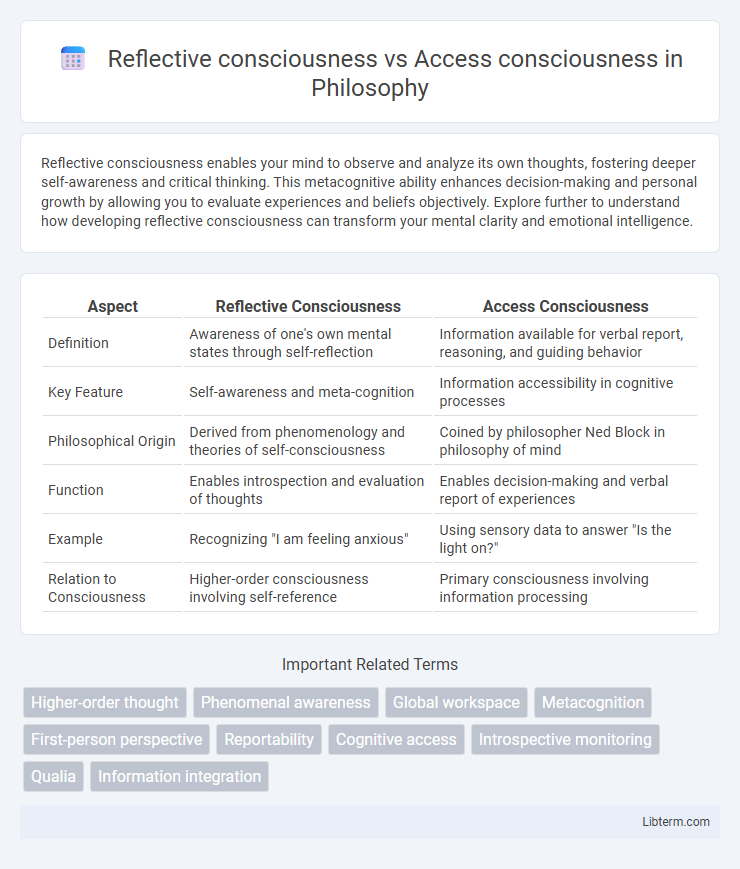Reflective consciousness enables your mind to observe and analyze its own thoughts, fostering deeper self-awareness and critical thinking. This metacognitive ability enhances decision-making and personal growth by allowing you to evaluate experiences and beliefs objectively. Explore further to understand how developing reflective consciousness can transform your mental clarity and emotional intelligence.
Table of Comparison
| Aspect | Reflective Consciousness | Access Consciousness |
|---|---|---|
| Definition | Awareness of one's own mental states through self-reflection | Information available for verbal report, reasoning, and guiding behavior |
| Key Feature | Self-awareness and meta-cognition | Information accessibility in cognitive processes |
| Philosophical Origin | Derived from phenomenology and theories of self-consciousness | Coined by philosopher Ned Block in philosophy of mind |
| Function | Enables introspection and evaluation of thoughts | Enables decision-making and verbal report of experiences |
| Example | Recognizing "I am feeling anxious" | Using sensory data to answer "Is the light on?" |
| Relation to Consciousness | Higher-order consciousness involving self-reference | Primary consciousness involving information processing |
Understanding Reflective Consciousness: Definition and Characteristics
Reflective consciousness refers to the capacity for self-awareness, where an individual can think about and evaluate their own mental states. It involves meta-cognition, enabling one to reflect on thoughts, beliefs, and experiences with explicit awareness and verbal reportability. Key characteristics include introspection, self-monitoring, and the ability to report one's conscious experiences, distinguishing it from access consciousness, which primarily concerns the availability of information for cognitive processing without self-reflection.
What is Access Consciousness? Core Concepts Explained
Access consciousness refers to the cognitive state in which information is readily available for verbal report, reasoning, and the control of behavior, enabling individuals to intentionally manipulate and utilize mental content. It involves the global availability of information within the brain that supports decision-making, attention, and action execution. Core concepts of access consciousness emphasize its functional role in connecting perception with cognitive processes, contrasting with reflective consciousness, which pertains to self-awareness and meta-cognition about one's mental states.
Theoretical Foundations of Consciousness Types
Reflective consciousness involves the meta-awareness of one's own mental states, enabling introspection and self-monitoring, rooted in higher-order thought theories. Access consciousness refers to the availability of information for reasoning, speech, and action, supported by neural mechanisms that enable wide cognitive accessibility. These foundational distinctions stem from cognitive science frameworks prioritizing different levels of information processing and self-representation in consciousness studies.
Key Differences Between Reflective and Access Consciousness
Reflective consciousness involves meta-awareness where individuals can think about their own mental states, enabling introspection and self-reporting of experiences. Access consciousness refers to the availability of information in the mind for cognitive processing, decision making, and verbal report without necessarily involving self-reflection. The key difference lies in reflective consciousness requiring higher-order self-monitoring, while access consciousness enables functional use of information without explicit awareness of that information.
Neural Correlates: Brain Activity in Reflective vs Access Consciousness
Reflective consciousness engages the dorsolateral prefrontal cortex and frontoparietal networks, reflecting higher-order cognitive processing and self-awareness. Access consciousness primarily involves activity in the sensory cortices and the global workspace network, enabling information to be broadcasted and utilized for reasoning and behavior. Neuroimaging studies highlight increased connectivity between prefrontal regions and posterior cortices during reflective awareness, contrasting with more localized activation during access consciousness.
Role in Cognitive Processes: Awareness, Memory, and Attention
Reflective consciousness enables self-awareness by allowing individuals to think about their own thoughts and experiences, playing a crucial role in higher-order cognitive processes such as meta-cognition and decision-making. Access consciousness facilitates the integration and manipulation of information for immediate cognitive tasks, directly influencing attention control, working memory, and perceptual awareness. Together, these forms of consciousness support complex mental functions by balancing introspective monitoring and real-time information processing.
Reflective Consciousness in Self-Awareness and Metacognition
Reflective consciousness involves the explicit awareness of one's own mental states, enabling individuals to engage in metacognition by evaluating and controlling their thoughts and actions. This form of self-awareness allows for introspection and the capacity to reflect on personal experiences, contributing to higher-order cognitive processes such as decision-making and problem-solving. Studies in neuroscience link reflective consciousness to prefrontal cortex activity, highlighting its role in self-monitoring and adaptive behavior.
Access Consciousness and Information Availability
Access consciousness refers to the ability of information to be directly available for cognitive processes such as reasoning, decision-making, and verbal report. This form of consciousness emphasizes the accessibility of information in working memory that can influence behavior and guide actions without necessarily being introspected upon. Unlike reflective consciousness, access consciousness prioritizes the functional availability of information for real-time processing and response.
Philosophical Perspectives: Implications for Mind and Self
Reflective consciousness involves the capacity to think about one's own mental states, enabling self-awareness and introspection fundamental to the philosophy of mind and theories of selfhood. Access consciousness refers to information in the mind available for reasoning, decision-making, and verbal report, crucial for cognitive functions but not necessarily accompanied by self-reflective thought. Philosophers argue that distinguishing these forms of consciousness sheds light on the nature of subjective experience and personal identity, impacting debates on mental representation and the unity of consciousness.
Practical Applications: Mental Health, Learning, and Artificial Intelligence
Reflective consciousness enables individuals to consciously evaluate and regulate their mental states, improving therapeutic outcomes in mental health by fostering self-awareness and emotional regulation. Access consciousness, characterized by the availability of information for reasoning and action, enhances learning processes through efficient encoding and retrieval of knowledge. In artificial intelligence, integrating access consciousness models supports real-time decision-making, while incorporating reflective consciousness principles advances self-monitoring capabilities and adaptive learning in AI systems.
Reflective consciousness Infographic

 libterm.com
libterm.com